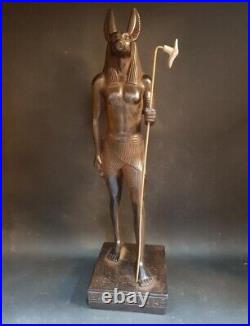
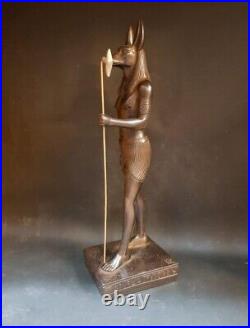
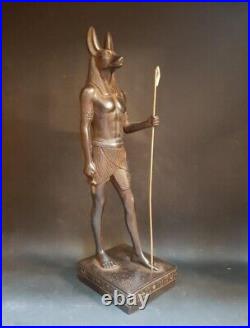
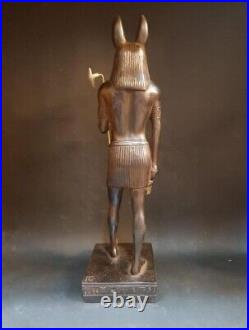
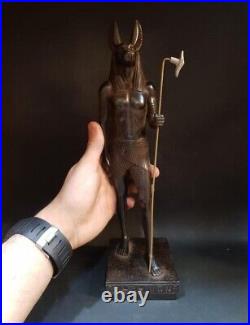
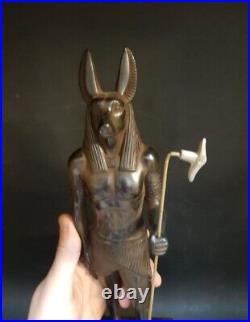

Ancient Egyptian Antiquities statue of God Anubis Egyptian Pharaonic BC. Anubis is one of the most iconic gods of ancient Egypt. Anubis is the Greek version of his name, the Ancient Egyptian knew him as Anpu (or Inpu). Anubis was an extremely ancient deity whose name appears in the oldest mastabas of the Old Kingdom and the Pyramid Texts as a guardian and protector of the dead. Anubis from He was originally a god of the underworld, but became associated specifically with the embalming process and funeral rites. His name is from the same root as the word for a royal child, “inpu”. However, it is also closely related to the word “inp” which means “to decay”, and one version of his name (Inp or Anp) more closely resembles that word. As a result it is possible that his name changed slightly once he was adopted as the son of the King, Osiris. He was known as “Imy-ut” (“He Who is In the Place of Embalming”), “nub-tA-djser” lord of the scared. Anubis is one of the most well-known and ancient deities in Egyptian mythology. He is often depicted with the head of a jackal or a dog-like creature, and he is associated with death, mummification, and the afterlife. In ancient Egyptian belief, Anubis played a crucial role in the process of death and the journey to the afterlife. He was considered the guardian and protector of the deceased and the god who oversaw the weighing of the heart ceremony, also known as the Weighing of the Heart. This ceremony determined the fate of the deceased in the afterlife, where their heart would be weighed against the feather of Ma’at, the goddess of truth and justice. If the heart was found to be lighter than the feather, the person would be deemed worthy and granted passage to the eternal paradise known as the Field of Reeds. If the heart was heavy with sin, it would be devoured by a monstrous creature and the person would face eternal punishment. Anubis was also closely associated with mummification and the rituals surrounding burial. He was believed to have invented the embalming process and was responsible for protecting the body during the preservation and wrapping stages. As such, he became known as the Lord of the Mummy Wrapping. In addition to his role in the afterlife, Anubis was also associated with the divination of the future and guidance in matters of the occult. He was considered a wise and knowledgeable deity who had insight into the mysteries of life and death. Anubis enjoyed widespread popularity throughout ancient Egypt, and numerous temples were dedicated to his worship. He was also frequently depicted in funerary art, tomb paintings, and amulets. Over time, Anubis became assimilated with other deities, such as Osiris, the god of the dead and the ruler of the afterlife. Overall, Anubis held a significant place in Egyptian mythology as the god of death, mummification, and the afterlife. His role in guiding the deceased and overseeing the judgment of the soul ensured his enduring presence in the hearts and minds of the ancient Egyptians. Condition: Good Condition As shown in pictures. Provenance: Stone in the Desert of the Egyptian City of Luxor.

